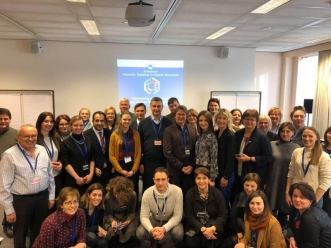Participation in CBHE Grantholders’ Meeting Held on 28-29 January 2019 in Brussels
February 1, 2019
This two-day meeting was addressed to the representatives of CBHE projects selected under the Call for proposals EAC/A05/2017. Its overall aim was to address in detail practical issues related to the implementation of your project, the management of the grant agreement and the financial rules applicable to the CBHE grant. The meeting was also an excellent opportunity for new and experienced practitioners to network with other projects.
The meeting was divided into plenary sessions, parallel workshops sessions and a helpdesk.
The workshop sessions were devoted to financial issues. The helpdesk allowed individual projects to meet their EACEA Project Officers. Other helpdesks allowed participants to meet with representatives from the International Contact Points (ICPs) in the Programme Countries, representatives from the National Erasmus+ Offices (NEOs) located in some of the Partner Countries and representatives from the European Commission and the Agency in charge of other Erasmus+ and Marie Sklodowska Curie actions in order to discuss project implementation issues.
Finally, a time-slot was devoted to networking between project representatives in order to encourage interactions and discussions between projects working in the same regions.
The participants in this event were also the Coordinator of Erasmus+ KA2 "Modernization of Environment Protection Studies Programmes for Armenia And Georgia" (MENVIPRO) project from University of Tuscia, Italy and the Armenian Coordinator of the project Gevorg Tepanosyan.
In order to radically modernize the MSc. education in EP – technology-intensive domain of knowledge, the project will establish a unique inter-University education and research facility, which will be used for student projects, collaborative projects with external stakeholders and demonstration activities to reinforce links to the University environment and promote environment-friendly mindsets. The ERLEP will represent one of the major tangible outcomes of the project and will define the quality standards of postgraduate studies in the field of EP for many years. Moreover, the ERLEP will provide the access to a modern laboratory infrastructure and enable various projects between Universities and external stakeholders.



